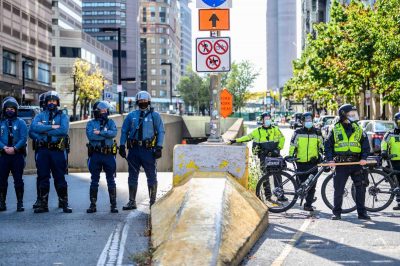The Boston City Council Committee on Ways and Means met Friday to discuss Boston Police overtime. Councilors and BPD representatives offered solutions to prevent the department from going over-budget in the future and noted that it has likely already run-over this fiscal year.

The hearing came after Mayor Marty Walsh announced in June that $12 million — 20 percent of BPD’s then-$60 million overtime budget — would be relocated to other City programs aimed at combating systemic racism.
As of Feb. 19, BPD has used up 660,650 hours of the 727,000 overtime hours budgeted for fiscal year 2021, which ends June 30.
The BPD is “legally permitted to run over” its overtime budget, according to the hearing order.
Ways and Means Chair Kenzie Bok, who represents District 8, sponsored the hearing along with Councilors Andrea Campbell and Matt O’Malley.
“It’s [an] effort … to really track where we are on the budget commitment that we made in the City’s FY21 budget to hold the police department overtime to $48 million for the year,” Bok said during the hearing. “We want to be shifting work that is better done outside of the police department to other shoulders and help our police officers focus on police work.”
Overtime spending is projected to exceed $48 million, which Bok said in an interview is “unbelievably disappointing.”
The meeting began with a presentation from BPD Superintendent James Hasson.
“We do recognize the importance of working within our budget,” Hasson said, “But also, we recognize the importance of maintaining public safety, which is our primary function.”
Hasson said replacement costs made up 43.5% of the total overtime budget in FY21, as opposed to 36% in FY20 — adding the increase in spending was largely due to increased officers on medical leave, which is a number exacerbated by the COVID-19 pandemic.
“At one point, we had over 300 officers out of work,” Hasson said. “We’re vigorously working to get that under control.”
In an interview after the meeting, Bok said the pandemic was not the driving cause behind the high number of officers on medical leave. She said the pandemic was “masking the sheer depth of the issue” because of the lack of public events, which make up a significant portion of police overtime work.
Bok cited a WBUR study that found the number of BPD officers on long-term injury or sick leave started rising “sharply” from January 2019 to January 2020 and continued to rise through 2020.
“I’m frustrated that the department still hasn’t given us a real explanation for why those numbers are so high,” Bok said.
Hasson said BPD is taking steps to try to reduce the number of officers on medical leave.
“Anybody with two and a half years or more on injured, we’re moving to involuntary retirement, unless they have some really special circumstances,” he said. “We have, right now, 22 people that we’ve submitted paperwork since the first of the year.”
During the hearing, Councilor Ed Flynn, who represents District 2, offered a solution to the overtime: hiring more police officers.
“One thing we haven’t mentioned is we don’t have enough police officers on the streets of Boston,” Flynn said. “As I’ve said for the last three years, we need to hire several hundred more police officers. That will address the issue of forced overtime.”
Bok noted that the City already had two cadet classes this year.
“I don’t think the solution at all is to add hundreds more police officers,” Bok said.
Councilor Lydia Edwards of District 1 asked at the meeting if anyone at BPD was concerned about the overtime budget.
“When this cut was made, the intent, at least the publicly stated intent, seemed to be that some of this work would be shifted to other people, public health or what have you, and that really hasn’t seemed to happen,” BPD Superintendent Kevin McGoldrick said.
Edwards said she agreed and hoped for a “comprehensive conversation” about restructuring the police department in the future.
Around noon — two hours into the hearing — Bok invited Larry Calderone, president of the Boston Police Patrolmen’s Association, to give testimony.
“I don’t understand how we can continue to do more with less,” Calderone said. “As respectful as I can say it, I think we need to stop this charade of ‘hey, we can cut police services by cutting the overtime budget.’”
Calderone said many of the councilors in the meeting once asked for more officers in their neighborhood.
“We are woefully understaffed,” Calderone said. “We can’t cut the police budget if we’re not given adequate budget to begin with. We’re not going to stop investigating crimes, homicides, sexual assaults, crimes against children … we can’t stop policing.”
No other public testimony was given. Bok later said in an interview she hoped to see more of an initiative from the BPD, and real shifts in responsibility have to come from within the department.
“They don’t happen because policymakers write them down on a sheet of paper,” Bok said. “The department has to show up in our budget hearing with a real plan.”




